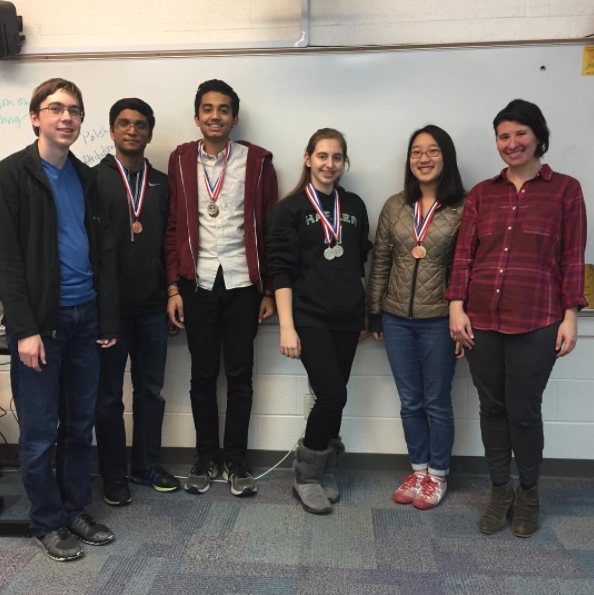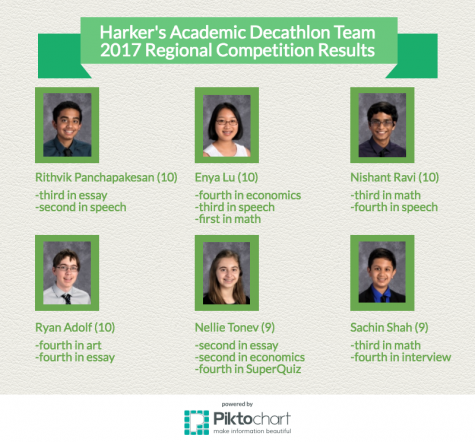Newly-formed Harker Academic Decathlon team starts off strong in first year of competition

Courtesy of Harker Academic Decathlon
The Harker Academic Decathlon team and team advisor Michelle Andelman pose for a group photo in Ms. Andelman’s room. The team earned a total of 14 awards at the regional competition on Jan. 14.
March 3, 2017
Students sit at long rows of desks, staring intently at a series of multiple choice questions on a testing sheet. The room is relatively quiet—filled with a silence only broken by an occasional cough or sneeze—but careful observers hear the faint scratching of pencils on paper and the soft thumping of erasers on desks.
The Upper School’s first-ever Academic Decathlon team, consisting of members Rithvik Panchapakesan (10), Enya Lu (10), Nishant Ravi (10), Ryan Adolf (10), Nellie Tonev (9) and Sachin Shah (9), participated in one of California’s regional competitions of the United States Academic Decathlon on Jan. 14.
Though rookies to the competition, Harker took home 14 awards from the tournament. Prior to the event, the members of the team prepared both by themselves and with their peers in a collaborative work environment.
“There were group study sessions that were held approximately once a week for the entirety of the fall semester leading up to the regional competition,” Harker Academic Decathlon team advisor Michelle Andelman said. “These study sessions followed some different formats; sometimes, students would be responsible for creating slide presentations to share with each other. Other times, the format would be lecture.”
Rithvik placed third in essay and second in speech; Enya placed fourth in economics, third in speech and first in math; Nishant placed third in math and fourth in speech; Ryan placed fourth in art and fourth in essay; Nellie placed second in essay, second in economics and fourth in Super Quiz and Sachin placed third in math and fourth in interview.
“I was pleasantly surprised [with how well I did]; going into regionals, the tests were a lot harder than I had expected and I encountered a lot of questions I didn’t know the answers to,” Enya said. “I’m pretty happy that I did well, but I know that I have a lot more to improve [on], and this placing definitely motivates me to do better.”
This year’s theme was World War II, and tests in the seven academic areas of science, social science, literature, art, music, economics and mathematics all evaluated students’ knowledge of both general concepts of each subject and more specific subtopics directly related to World War II itself.
In addition to these 30-minute multiple choice events, competitors composed an expository essay in 50 minutes on one of three topics presented to them during the competition.
“I picked the prompt related to chemistry and wrote about the importance and the effects of Rutherford’s gold foil experiment,” Ryan said. “[For the academic tests], it was economics that I did the worse in. That’s probably because I have very little knowledge of economics and it was harder to guess at the problems I didn’t know.”
The three oral components of the competition—a speech, an interview and a quiz-show style Super Quiz—tested participants’ public speaking skills. Students gave both a prepared four-minute speech and an impromptu two-minute speech following a one minute of prep time on one of three subjects given to them during the round.
“I actually can’t remember where I first heard about Academic Decathlon, but the competition really caught my interest [because it advocates] well-roundedness and [enforces] important skills, including public speaking and test-taking strategies,” Nellie said. “Though there’s definitely room for improvement, especially in the subjects I hadn’t spent much time studying, I was overall happy with my results.”
A new program introduced as a school club for Harker students this year, the Academic Decathlon invites high school students from across the nation to gather at decided local, regional and national venues to compete against teams from other schools in a tournament testing both general knowledge and public speaking skills.
“Our club is pretty cool because it fosters a collaborative learning environment, where students can learn content from each other but can also hone their study skills,” Ms. Andelman said. “I absolutely think [the Academic Decathlon] would be a tremendous opportunity for students who love to learn and who are looking to hear feedback on their studying skills.”
The Academic Decathlon is sponsored by the United States Academic Decathlon Association, an organization founded in 1968 by Robert Peterson, the county superintendent of schools in Orange County at the time. While the inaugural contest was a local event, hosting around 100 students from 20 Orange County high schools, the Academic Decathlon has since grown to include various levels of competition.
Currently, the United States Academic Decathlon honors four tiers of events: local scrimmages, regional competitions, state tournaments and the national convention. In order to qualify for the following stage, school teams must finish at the top of the rankings for each round.
The California Academic Decathlon, the largest state-level delegation of the United States Academic Decathlon, hosts its state tournament from March 23 to 26 in Sacramento. The event’s results will then determine which representatives from California are sent to the national convention, which will be hosted in Madison, Wisconsin from April 20 to 22.

The Harker Academic Decathlon team competed in one of the California Academic Decathlons’ regional competitions on Jan. 14. A total of three schools, including Harker, sent representatives to the event.


















![“[Building nerf blasters] became this outlet of creativity for me that hasn't been matched by anything else. The process [of] making a build complete to your desire is such a painstakingly difficult process, but I've had to learn from [the skills needed from] soldering to proper painting. There's so many different options for everything, if you think about it, it exists. The best part is [that] if it doesn't exist, you can build it yourself," Ishaan Parate said.](https://harkeraquila.com/wp-content/uploads/2022/08/DSC_8149-900x604.jpg)




![“When I came into high school, I was ready to be a follower. But DECA was a game changer for me. It helped me overcome my fear of public speaking, and it's played such a major role in who I've become today. To be able to successfully lead a chapter of 150 students, an officer team and be one of the upperclassmen I once really admired is something I'm [really] proud of,” Anvitha Tummala ('21) said.](https://harkeraquila.com/wp-content/uploads/2021/07/Screen-Shot-2021-07-25-at-9.50.05-AM-900x594.png)







![“I think getting up in the morning and having a sense of purpose [is exciting]. I think without a certain amount of drive, life is kind of obsolete and mundane, and I think having that every single day is what makes each day unique and kind of makes life exciting,” Neymika Jain (12) said.](https://harkeraquila.com/wp-content/uploads/2017/06/Screen-Shot-2017-06-03-at-4.54.16-PM.png)








![“My slogan is ‘slow feet, don’t eat, and I’m hungry.’ You need to run fast to get where you are–you aren't going to get those championships if you aren't fast,” Angel Cervantes (12) said. “I want to do well in school on my tests and in track and win championships for my team. I live by that, [and] I can do that anywhere: in the classroom or on the field.”](https://harkeraquila.com/wp-content/uploads/2018/06/DSC5146-900x601.jpg)
![“[Volleyball has] taught me how to fall correctly, and another thing it taught is that you don’t have to be the best at something to be good at it. If you just hit the ball in a smart way, then it still scores points and you’re good at it. You could be a background player and still make a much bigger impact on the team than you would think,” Anya Gert (’20) said.](https://harkeraquila.com/wp-content/uploads/2020/06/AnnaGert_JinTuan_HoHPhotoEdited-600x900.jpeg)

![“I'm not nearly there yet, but [my confidence has] definitely been getting better since I was pretty shy and timid coming into Harker my freshman year. I know that there's a lot of people that are really confident in what they do, and I really admire them. Everyone's so driven and that has really pushed me to kind of try to find my own place in high school and be more confident,” Alyssa Huang (’20) said.](https://harkeraquila.com/wp-content/uploads/2020/06/AlyssaHuang_EmilyChen_HoHPhoto-900x749.jpeg)









